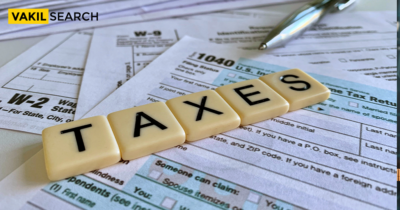In this article we shall discuss professional tax conceptually and take a close look at its applicability and its salient features
If you work as a salaried professional Tax, chances are that you take salary deductions in the name of professional tax. If you go through your monthly salary break-up, you might see that there are certain deductions done on it. What are these deductions? Why are they made and who makes them? These are questions that all of us would like to get their answers Well, in this article we will try to shed some light on those things. Here’s a look at what professional tax is and why it is essential.
What Is Professional Tax?
If you are a salaried professional who draws a regular income, then you must be paying a professional tax to your State government. Most states have a system in place for handling professional tax, whereas some states have foregone this tax. However, since the State government handles this on its own, the rules vary for different states. The only ruling with regards to this concerning the Central government is a maximum cap they have suggested. No state in India can collect more than ₹ 2,500 per annum from an individual as a professional tax.
Do Only Professionals Have To Make Professional Tax Payments?
While the term itself can be quite misleading, this isn’t a tax that professionals need to pay. Instead, it is a tax that all salaried professionals working in India must pay. The umbrella term includes everyone from regular employees to business owners in India. However, the percentage they have to pay depends on the slab rates of their respective State governments. Most salaried employees will find that their monthly salary contains a deduction in the name of professional This amount is calculated based on your primary salary, what profession you are a part of, and in which state you reside. In case you are a professional freelancer, then you must pay your due professional rate every year.
Tax Rates Of Various States In India
The chart given below shows all the States and Union Territories with their imposable professional tax rates for the year 2019-20:
However, there are few states such as Delhi and Haryana which have not made this tax applicable.
| State | Per month income | Tax rate /amount(per month) |
| Up to ₹15,000 | Nil | |
| Andhra Pradesh | ₹15,001-₹ 20,000/- | ₹ 150 |
| ₹20, 001/- or above | ₹200 | |
| Up to ₹10,000/- | Nil | |
Assam |
₹10,001/- ₹15,000/- | ₹150 |
| ₹15,001- ₹24,999/- | ₹180 | |
| ₹25,000/- or above | ₹208 | |
| Up to ₹25,000/- | Nil | |
| Bihar | ₹25,001- ₹41,666 | ₹83.33 |
| ₹41,667- ₹83,333/- | ₹166.67 | |
| ₹83,333/- or above | ₹208.33 | |
| Up to ₹15,000/- | Nil | |
| Goa | ₹15,001- ₹25,000/- | ₹150 |
| ₹25,001/- or above | ₹200 | |
| Up to ₹5,999/- | Nil | |
| Gujarat | ₹6,000-₹ 8,999 | ₹80 |
| ₹9,000- ₹11,999/- | ₹150 | |
| ₹12,000/- or above | ₹200 | |
|
Jharkhand
|
Up to ₹25,000/- | Nil |
| ₹25,001- ₹41,666/- | ₹100 | |
| ₹41,667- ₹66,666/- | ₹150 | |
| ₹66,667- ₹83,333 | ₹175 | |
| ₹83,334/- or above | ₹208( for first 11 months and ₹212 in last month) | |
| Karnataka | Up to ₹15,000/- | Nil |
| ₹15,001/- or above | ₹200 | |
| Up to ₹1,999 | Nil | |
| ₹2000- ₹2,999/- | ₹20 | |
| ₹3,000- ₹4,999/- | ₹30 | |
| ₹5,000- ₹7,499/- | ₹50 | |
| Kerala | ₹7,500-₹ 9,999/- | ₹75 |
| ₹10,000- ₹12,499/- | ₹100 | |
| ₹12,500-₹ 16,666/- | ₹125 | |
| ₹16,667-₹ 20, 833/- | ₹166 | |
| ₹20,834/- or above | ₹208 | |
| Madhya Pradesh | Up to ₹18,750/- | Nil |
| ₹18,751- ₹25,000/- | 125 | |
| ₹25,001- ₹33,333/- | 167 | |
| ₹33,334/- or above | 208(11 months)&212(12th month) | |
| Up to ₹7,500/- | Nil | |
Maharashtra |
₹7,501- ₹10,000/- | ₹175 |
| Above ₹10,001/- | ₹209 (11months) & ₹300(12th month) | |
| Up to ₹4,250/- | Nil | |
| Manipur | ₹4,251 – ₹6,250/- | ₹100 |
| ₹6,251- ₹8,333/- | ₹167 | |
| ₹8,334- ₹10,416/- | ₹200 | |
| ₹10,417/- or above | ₹208 &₹212 | |
| Up to ₹41,66/- | Nil | |
| ₹4,167- ₹6,250/- | ₹16.50 | |
| ₹6,251- ₹8,333/- | ₹25 | |
| Meghalaya | ₹8,334-₹ 12,500/- | ₹41.50 |
|
|
₹12,501- ₹16,666/- | ₹62.50 |
| ₹16,667- ₹20,833/- | ₹83.33 | |
| ₹20,834- ₹25,000/- | ₹104.16 | |
| ₹25,001- ₹29,166/- | ₹125 | |
| ₹29,167- ₹33,333/- | ₹150 | |
| ₹33,334- ₹37,500 | ₹175 | |
| ₹37,501-₹41,666 | ₹200 | |
| Above ₹41,667/- | ₹208 | |
|
Nagaland
|
Up to ₹4,000/- | Nil |
| ₹4,001- ₹5,000/- | ₹35 | |
| ₹5,001- ₹7,000/- | ₹75 | |
| ₹7,001- ₹9,000 | ₹110 | |
| ₹9,001- ₹12,000/- | ₹180 | |
| ₹12,001/- or above | ₹208 | |
| Up to ₹13,304/- | Nil | |
| ₹13,305-₹25,000/- | ₹125 | |
| Odisha | ₹25,001-or above | ₹200(11 months) & ₹300(12th month) |
| Up to ₹16,666/- | Nil | |
| ₹16,667- ₹33,333/- | ₹41.66 | |
Puducherry |
₹33,334- ₹50,000/- | ₹83.33 |
| ₹50,001- ₹66,666/- | ₹125 | |
| ₹66,667-₹ 83,333 | ₹166.67 | |
| ₹83,333 and above | ₹208.33 | |
Punjab |
Above ₹20,833/- | ₹200 |
| Up to ₹20,000/- | Nil | |
|
Sikkim
|
₹20,001-₹30,000/- | ₹125 |
| ₹30,001- ₹40,000/- | ₹150 | |
| Above ₹40,000 | ₹200 | |
| Up to ₹3,500-/- | Nil | |
| ₹3,501-₹5,000/- | ₹.22.5 | |
| Tamil Nadu | ₹5,001- ₹7,500/- | ₹52.50 |
| ₹7,501-₹10,000/- | ₹115 | |
| ₹10,001- ₹12,500 | ₹171 | |
| Above ₹12,501/- | ₹208 | |
| Up to ₹15,000/- | Nil | |
| Telangana | ₹15,001- ₹20,000/- | ₹150 |
| ₹20,001- or above | ₹200 | |
| Up to ₹5,000/- | Nil | |
| ₹5,001-₹7,000/- | ₹70 | |
| Tripura | ₹7,001- ₹9000/- | ₹120 |
| ₹9,001- ₹12,000/- | ₹140 | |
| ₹12,001- ₹15,000/- | ₹190 | |
| ₹15,000 or above | ₹2496 | |
| West Bengal | Up to ₹10,000/- | Nil |
| ₹10,001- ₹15,000/- | ₹110 | |
| ₹15,001-₹25,000/- | ₹130 | |
| ₹25,001-₹40,000/- | ₹150 | |
| ₹40,001 or above | ₹200 |
The following is the list of the States and Union Territories where Professional tax is not levied on its professionals:-
- Arunachal Pradesh
- Andaman & Nicobar
- Chandigarh
- Dadra & Nagar Haveli
- Daman & Diu
- Delhi
- Haryana
- Jammu & Kashmir
- Lakshadweep
- Rajasthan
- Uttaranchal
- Uttar Pradesh
What Is The Difference Between Professional Tax Payment And Tax Deduction At Source?
First and foremost, you must understand the difference between tax deduction at source, or TDS and professional rate payment. Both these terms are often mistakenly used in place of one another. However, tax deduction at source is the amount cut by your employer based on a predetermined TDS slab. The income subjected to a tax deduction from source can include earnings from rent, fees, salaries, and even interest savings. Therefore, this works as the tax you have paid in advance. Thus, tax deducted at source leads to IT return filings which help you save up on tax later on. Such tax deducted on source helps the government know which all of your incomes have already been taxed. The government uses this information to exempt them from being taxed again.
However, professional tax payment does not work as IT returns are paid in advance. Since there is no national body governing the collection of professional tax, there is no one particular Professional slab. Instead, respective state governments come up with their slab rates for the same.
Who Needs To Make Professional Tax Payments?
- In case you are employed in a company or firm, your employer can pay your professional tax for you.
- Apart from employee salary deductions, the owner of the firm or company must make professional tax payments for the firm, based on its annual income.
- However, in case you run your practice, you must make sure you make the appropriate professional tax payments.
- The amount you need to pay depends on the work you do, how much you earn, and where you live.
- Also, different states have different slabs for professional tax payments.
- Moreover, various states have rules regarding which individuals are exempt from professional tax payment.
- As per the Professions and Employment Act 2000, everyone who earns their living by carrying out his/her own practice in any field must pay professional tax.
- Various occupations such as doctor, CA, medical staff, engineer, lawyer, freelancer, and even stenographer come under this category.
- The amount to be paid as professional tax payment depends on:
- Your earnings
- Threshold slab the earnings fall into
- State’s professional slab rate for the same
Calculation Of Professional Tax
In case your CTC salary per month is ₹ 50,000. After deducting EPF, leave, penalties, and other gratuities your take-home salary will be ₹ 40,000. The professional tax is calculated on this ₹ 40,000. Every month, depending on your gross salary, the required professional tax amount, as per your state’s sab rates is deducted from your pay. In case, if there is any increase or decrease in your gross salary, the new wage is compared with the state’s slab before deciding the Professional tax for the month.
Professional Tax Online Payment Procedure
The following is the procedure for online payment of professional tax
- To pay professional tax on your own, you must apply for a professional tax registration number.
- Companies and individuals can also make professional tax payments by visiting the nearest District Sales Tax office.
- The form for applying for the same is available on the state’s official professional tax payment website
- Once your application gets approved, and you receive a professional tax registration number, you may use that to make your professional tax payment.
- Log in to the web page using your credentials.
- Fill in all the required details on the Professional Tax payment form.
- Select the mode of payment, the period of payment and the amount to be paid.
- Click on Submit
- You will now be redirected to a payment portal.
- Choose an appropriate payment method and make the professional tax payment.
- Make sure you save the challan for future reference.
While the name or number of the form to be filled may vary from state to state, the basic framework for online payment of professional tax remains the same.
Penalty For Non-Paying The Professional Tax
For any delay in the payment of professional tax, the government has set up a penalty of 2% per month till the time the payment is made. Also, if there is a delay in obtaining the ‘Certificate of Enrolment’, there is a penalty at the rate of ₹ 2 per day, and if any information given is found to be inaccurate, the penalty increases to three times the tax to be paid.
Conclusion
The rate of professional tax varies from one state to another and any salaried individual should be aware of the prevailing rates. Consulting a Chartered Accountant or a Tax Consultant is always better as it would help in the prevention of any loss. Some states also provide a tax rebate if the tax is paid as a lump sum. So, preparing yourself in advance and gathering all the facts before submitting the professional tax will make you sound professional as well as personally clear.
Also, Read:









